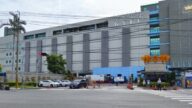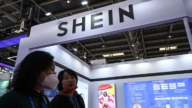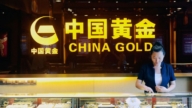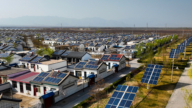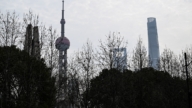【新唐人2013年12月25日讯】人民币在国内的购买力持续下降,而人民币汇率却不断走高,这种持续内贬外升的现象令国人困扰,“人民币对不起中国人﹗”似乎已经形成共识。不过专家指出,中共的利率货币政策,造成的大量外汇储蓄和人民币内贬外升现象,也给中国带来了负担。但是有一种人却从中受益,我们来看看他是谁。
近年来,伴随着人民币对内贬值和对外升值,中共权贵掠夺国家资源和全民的财富转移到海外后,在国外疯狂购买房产、地产和奢侈品,导致各国当地物价飙涨。
最近,美国休士顿,一个包含9个项目,近2,600套出租式公寓的收购大单,被中国私募基金与美国合作企业连手收入囊中,其中的私募基金——博裕投资的主要合伙人,其中就有中共原党魁江泽民27岁的孙子江志成。
另外,香港政府虽然努力给楼市降温,努力避免资产泡沫,但来自中国大陆的资金令港府很难控制住房价。
旅美经济评论专家杰森.马:“它在国外的购买力是在增强,这就是为什么中国人到美国旅游的时候,洗劫美国整个名牌店,能有机会旅游的人,这些人是赚到了,但是仅仅能维持在国内生存的人,物价越来越高,水快淹到脖子的这种挣扎的感觉。”
最近美联储宣布,维持0.0%-0.25%的低利率。而在中国大陆银行间的持续钱荒又掀高潮,相关利率已经达到6%以上。中共权贵所握资金,又利用高额的汇率差和利率差,从海外杀回大陆套利吸金,导致通货膨胀加剧。经济学家指出,随着美联储逐渐退出量化宽松,以及经济复苏,这些资金获利后又会撤出,被吸引回归美国。
大陆金融分析师任中道:“大量热钱的流入也导致人民币升值。外币来套利嘛,国外的资金要到国内来,央行就要发行人民币来进行这种等值的对冲,它就会不断的发下去。”
目前,中国已成为世界第一大货币发行国,截至11月末,中国广义货币余额已经达到107万9300亿元,与之相背离的是,大陆金融系统却持续钱荒。在号称世界第二大经济体的中国,老百姓却叫苦连天。
以往二十年,投资对中国经济增长贡献率,约在百分之五十左右。低利率又是刺激投资的有效手段,导致了“血征”、“血拆”蔓延中国。在二千万上访大军中,其中被强征、强拆的约占百分之七十以上。
杰森.马:“中共为了刺激经济大量的印钞票,造成了通胀,国内的贬值其实就是货币发行量造成的。但是同时它又对外限制自由兑换货币,控制人民币自由兑换,中国是一个出口为主的国家,造成国外人民币短缺的现实,造成人民币在国外又在升值。”
一九九四年汇率改革后,代表本国与外国进行经济交易而发生的中国经常项目,和资本项目一路顺差,经济畸型高速增长,引起全球资本流入,使资本项目的顺差进一步扩大。外汇储备逐年攀升,外汇处于供过于求的状态。
1993年底,中国外汇余额仅1432亿美元,1994年外汇改革后,年底中国外汇余额上升到4482亿美元,2000年底达到14291亿美元。
杰森.马:“目前中国庞大的外汇储备,不是中国的骄傲,是中国负担,它不得不把国外的货币作为财富承担的载体,国外人家就把货币贬值,国内的财富就在缩水。”
对于依赖出口拉动经济的中共来说,要获得外贸交易,要做出外贸顺差,不得不答应合作国家要求人民币升值的要求。
国内经济律师郑恩宠指出,在中央集权及人治型的货币发行机制下,央行对基础货币的投放越来越被动,人民币长期“内贬外升”,不仅不能加强中共的执政地位,恰恰是促使“亡党失政”重要动因。
采访编辑/刘惠 后制/陈建铭
RMB Devaluation: Who Wins?
While the purchasing power of RMB continues to decline
in Mainland China, the exchange rate has continued to rise.
This phenomenon has troubled Chinese people. People
complain, saying, “RMB should be sorry to the Chinese."
Experts say that the Communist Communist Party (CCP)
currency policy has created huge foreign exchange reserves.
It has also created the devaluation of RMB in China,
high exchange rate overseas, and a burden to China.
As for who is exactly benefiting
from this policy, we will take a look.
In recent years, China has seen depreciation of the RMB
domestically, and appreciation in foreign exchange rates.
Elite groups of the CCP have plundered national
resources and wealth, transferring them overseas.
This is done through buying overseas
properties, real estate, and luxury goods.
This leads to soaring prices in the foreign countries.
Recently, Chinese buyers have purchased
property in Houston, USA, containing nine projects,
and approximately 2,600 rental apartments.
Among them is Boyu Capital, a Chinese private equity fund.
Reportedly, Jiang Zemin’s 27-year-old grandson,
Jiang Zhicheng, is a major investor in Boyu Capital.
In addition, Hong Kong, has tried to cool down
the property market, to avoid a property bubble.
Investment from China has made it hard to control.
Jason Ma, financial expert: “RMB
purchasing power abroad is strong.
That’s why Chinese tourists have
swamped branded stores in the US.
To those who take advantage of traveling
and shopping, they are the winners.
But to those who struggle to make both ends
meet, they are faced with higher and higher prices."
The US Federal Reserve has decided
it’s fund rates unchanged at 0.0-0.25%.
Interbank rates have gone as high as 6% in China.
CCP officials thus take advantage of high interest rate
differentials, and make profits from huge assets they hold.
They do this by transferring them
back to China to absorb the interests.
As a result, inflation is further increased in China.
Economists explain that following the end of the
Federal Quantitative Easing policy, and recovery
of the economy in the US, those funds will transfer
back to the US after absorbing interests in China.
Ren Zhongdao, financial analyst: “Inflow of hot
money will lead to the appreciation of the RMB.
As foreign currency rushes into China to absorb interests,
the central bank will issue RMB to balance the needs.
This will continue."
China has become the world’s largest currency issuing country.
As of the end of November, China’s broad measure of money
supply, called M2, exceeded 107 trillion yuan ($17.6 trillion).
This is despite the lasting cash crunch
of the Chinese finance sectors.
In the world’s second largest
economy, China, people are suffering.
In the past two decades, investment has contributed
to around 50% of China’s economic growth.
Low interest rates, as an effective means of
stimulating investment, have led to forced land
acquisition, and forced demolition throughout China.
Among some twenty million petitioners, over 70% of them
are victims of forced land acquisition and forced demolition.
Jason Ma: “To stimulate the economy, the CCP
injects huge amounts of cash, and creates inflation.
The devaluation of the RMB in China
is being caused by the printed money.
However, the CCP also limits free
conversion to foreign currencies.
China relies heavily on exports.
Its policy has thus created shortages of RMB overseas,
and the appreciation of the RMB in foreign countries."
Since the 1994 exchange rate reforms, surplus
has occurred as a result of Chinese industries
and projects with frequent international trades.
Abnormal economic growth has attracted global
capital inflows, and has created further surplus.
Foreign exchange reserves have
increased beyond adequate levels.
By the end of 1993, China’s foreign
exchange reserve was $143.2 billion.
After the 1994 foreign exchange reforms, foreign exchange
reserves rose to $448.2 billion at the end of that year.
By the end of 2000, it had reached $1.4291 trillion.
Jason Ma: “China’s huge foreign exchange reserves
are not the pride of China, but are the burden to China.
Foreign currencies have become the carriers of wealth.
Once foreign currency is devaluated,
domestic wealth starts to shrink."
An export-led economy has forced the CCP to agree
with trading countries demands to appreciate the RMB.
This is in order to achieve the trade surplus.
Deng Enchong is a lawyer specializing in finance.
Deng Enchong indicates that under centralization, the central
bank’s injection of cash has become even more passive.
The CCP’s ruling will only become weaker
with a prolonged devaluation of the RMB
domestically and appreciation internationally.
This will also serve as a driving cause
to finally extinguish the party and it’s rule.
Interview & Edit/LiuHui Post-Production/ChenJianming



